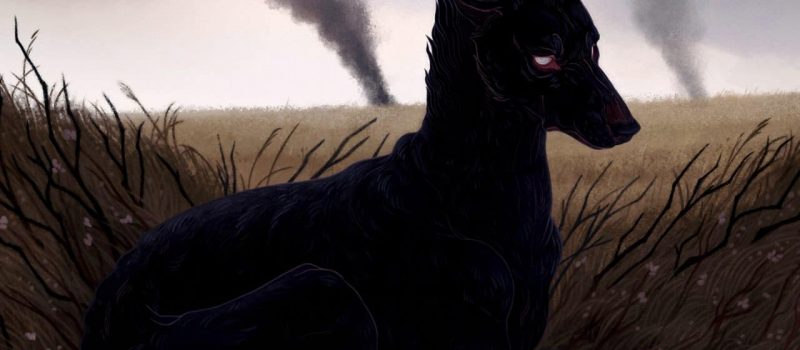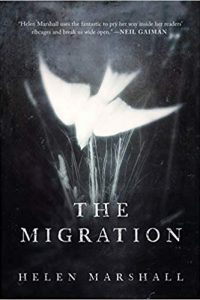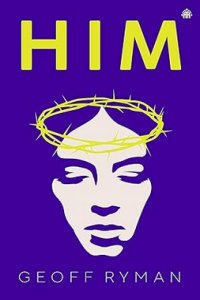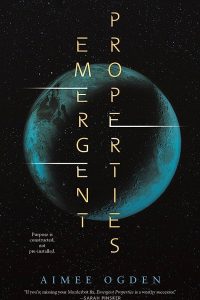Karen Burnham Reviews Short Fiction: Strange Horizons, The Deadlands, khōréō, and The Economist
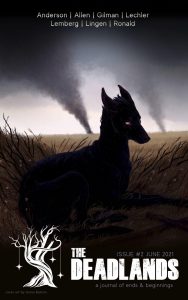 Strange Horizons 5/31
Strange Horizons 5/31
The Deadlands 6/21
khōréō 6/21
The Economist 6/25/21
At the end of May Strange Horizons put out a special issue dealing with transgender themes. Along with nine poems and three non-fiction articles are three original short stories. My favorite is ‘‘Women Want Me, Fish Fear Me’’ by Paris Green. In this future, genemods based on different animals are fairly common, and the narrator’s are fish-based. This led to transformations different from what they expected and didn’t solve all of their problems, facts which get expressed partly in dialog with the different partners they have in the course of their sex work. It’s arch and funny and insightful. ‘‘The Chicken House’’ by Jenny Fried is pure Strange Horizons, intensely emotional and allusive. Sleep is a young man living alone on a farm with three buildings: the tractor shed, the chicken house to be avoided at all costs, and the house. In the walls of the house are a flock of dead cardinals, and there’s a red dress, and Sleep will eventually have to face the chicken house itself. Finally we have ‘‘A Welling Up’’ by Natalia Theodoridou, in which a daughter is driving her mother around, searching for the brother who was abandoned to foster care many years ago. The mother is clearly not quite living in the same world as the rest of us, and flooding tends to follow in her wake. There are a lot of layers here, and the story comes to a satisfying conclusion.
I was able to catch the second issues for two new venues this month, The Deadlands (edited by E. Catherine Tobler who previously edited Shimmer) and khōréō (editor-in-chief Aleksandra Hill). With its title The Deadlands isn’t hiding anything: this is speculative fiction about Death. While that theme obviously lends itself to horror, there are plenty of ways to approach the topic using all kinds of genre toolkits. Of the three original pieces in issue #2, my favorite is ‘‘Shuck’’ by G.V. Anderson. Bridget is dealing with the gruesome death of her friend Samantha by relating details of it to any school friend who’ll throw some money her way. But she’s also seeing the huge black dog of legend, known in areas around Suffolk as Black Shuck. She’s most concerned about her grandfather who has been raising her, and is determined not to let the fearsome dog come out of the shadows. There’s a lot of believable teen angst layered into the story, but the ending goes deeper. The other stories are ‘‘The Thing That Doesn’t Disintegrate’’ by Kate Lechler, a character portrait of a Mississippi woman currently obsessed with collecting skulls and teeth; and ‘‘Bonefields’’ by Margaret Ronald, where Rhode is returning home even as he turns to stone and Wist is tagging along to get away from the circus. There’s also poetry, and if you’re able to pick up an issue make sure to check out Amanda Downum’s ‘‘Ask a Necromancer’’ non-fiction column, which is both entertaining and informative.
khōréō is a magazine of ‘‘speculative fiction and migration,’’ which is another theme that casts a very wide net. My favorite of the issue is ‘‘For Future Generations’’ by Rachel Gutin. Rabbi Greenberg wakes up on the morning of the Sukkot holiday to find that the sukkah needed to conduct the ceremony has been completely destroyed, in such a way that even the pieces can’t be reused. This is especially horrible on a generation starship fleeing a ruined Earth, where no new supplies are available. Asking around quickly reveals that some teenage girls of her own congregation are responsible, and Rabbi Greenberg is able to get at some of the reasons underlying the vandalism. This leads her to a deeper reevaluation of the holiday and its meaning. Other stories include ‘‘Golden Girl’’ by A.M. Guay, a tale of cross-cultural adoption gone horribly wrong; ‘‘Our Bones Were the Mortar’’ by Anjali Patel, where a woman who sees the dead tries to go to Manhattan to get a normal job – instead she finds a city built on corpses; ‘‘Green, Yellow, Red’’ by H. Pueyo is a science fictional take on the phenomenon of disappeared persons in Latin America; and ‘‘Love at the End’’ by Deborah Germaine Augustin, is a story of love and ruin told backwards. Both The Deadlands and khōréō are off to strong starts, and I wish them much success in the future.
Once a year The Economist magazine runs a ‘‘What If?’’ section dedicated to ‘‘news articles’’ written as if in a future issue which are published, like most of their articles, without an author byline. These certainly count as little snippets of science fiction, and while they lack in the plot and character department they are superb in the arena of informed speculation about the near future. If you’re able to get your hands on a copy or find your way through the paywall on their website, these are well worth your time. One scenario will be familiar to those who read Kim Stanley Robinson’s 2020 tour de force, The Ministry of the Future. ‘‘If a deadly heat wave hit India: A tale of two cities’’ imagines a particularly disastrous 2041, but goes on to contrast Chennai with Hyderabad since the latter prepared much more thoroughly after their own brush with a lethal heatwave in 2015 (when 585 people died in just a few days there). There are articles on personalized health care and nutrition plans, biohacking, and treatments for opioid addiction and dementia. ‘‘What if marmosets lived on the Moon?’’ imagines a morale boost for a lunar colony from was briefly cut off by a crisis on Earth; there’s some interesting speculation about pregnancy in low gravity, where the marmosets might be able contribute in their original role as research animals. Finally there may be protests in Sweden in 2036 ‘‘If an AI won the Nobel prize for medicine: Rage against the machine’’. That one also includes some interesting thoughts about potential evolutionary steps forward from today’s machine learning algorithms.
Recommended Stories
‘‘Shuck’’, G.V. Anderson (The Deadlands #2)
‘‘Women Want Me, Fish Fear Me’’, Paris Green (Strange Horizons 5/31/21)
‘‘For Future Generations’’, Rachel Gutin (khōréō #2)
Karen Burnham is an electromagnetics engineer by way of vocation, and a book reviewer/critic by way of avocation. She has worked on NASA projects including the Dream Chaser spacecraft and currently works in the automotive industry in Michigan. She has reviewed for venues such as Locus Magazine, NYRSF, Strange Horizons, SFSignal.com, and Cascadia Subduction Zone. She has produced podcasts for Locusmag.com and SFSignal.com, especially SF Crossing the Gulf with Karen Lord. Her book on Greg Egan came out from University of Illinois Press in 2014, and she has twice been nominated in the Best Non-Fiction category of the British SF Awards.
This review and more like it in the September 2021 issue of Locus.
 While you are here, please take a moment to support Locus with a one-time or recurring donation. We rely on reader donations to keep the magazine and site going, and would like to keep the site paywall free, but WE NEED YOUR FINANCIAL SUPPORT to continue quality coverage of the science fiction and fantasy field.
While you are here, please take a moment to support Locus with a one-time or recurring donation. We rely on reader donations to keep the magazine and site going, and would like to keep the site paywall free, but WE NEED YOUR FINANCIAL SUPPORT to continue quality coverage of the science fiction and fantasy field.
©Locus Magazine. Copyrighted material may not be republished without permission of LSFF.


